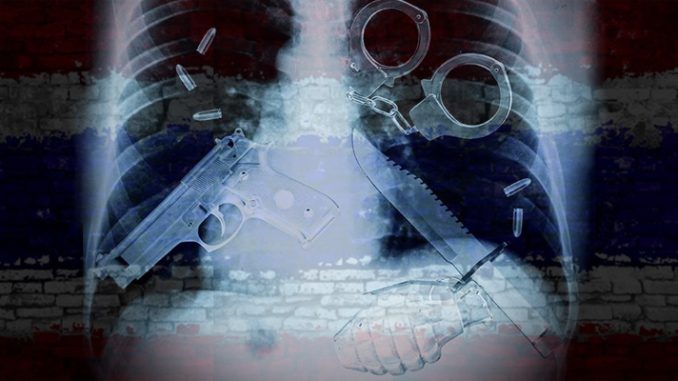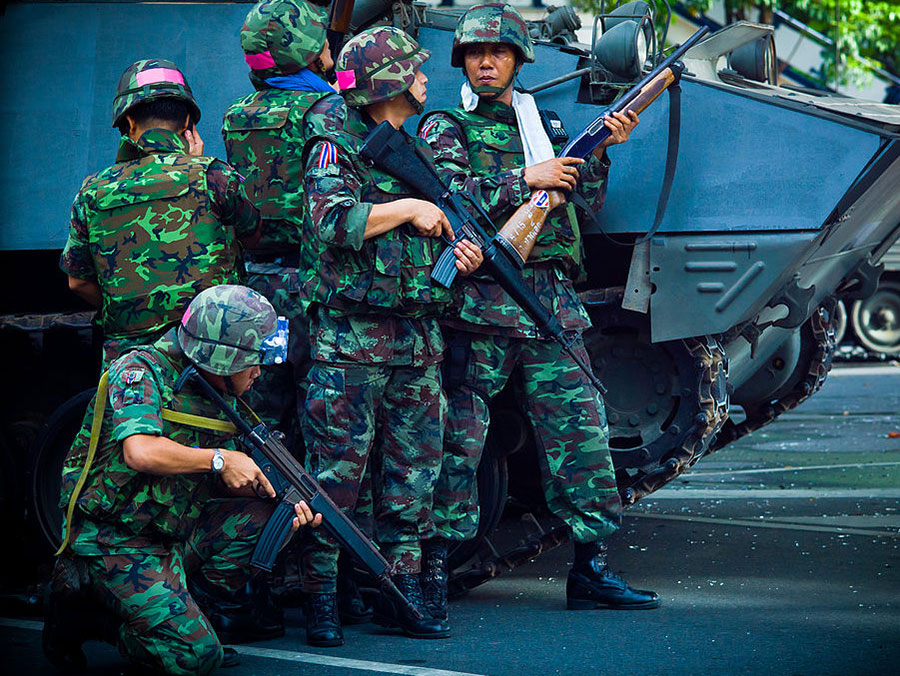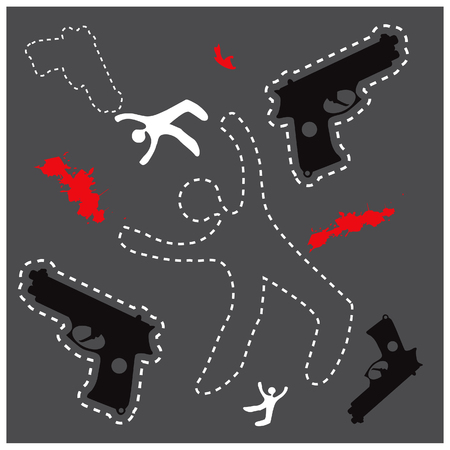
Thailand is no stranger to political assassination. Since the revival of the parliamentary system and elections in the late 1970s, Thai society has witnessed the increasing frequency of assassination of Members of Parliament, nouveau riche tycoons, provincial bosses, and vote canvassers by professional gunmen. These political killings are private-enterprise murders relating to national and local electoral competition, with political and business rivals contracting gunmen to take out opponents. The gunmen are mainly professional assassins, former security guards, petty gangsters, moonlighting policemen and military personnel. The violence has occurred both before and after elections: effective candidates were threatened with violence, kidnapped or killed by the rivals during the course of campaigning. Disloyal vote canvassers were also killed by their own bosses, and successful vote canvassers were eliminated by opponents from rival camps. Benedict Anderson argues that the increasing prevalence of politically motivated murders in the late 1980s reflected the high “market value” of Members of Parliament in Thailand, thereby signaling the greater importance of elections in determining who would obtain political power. The widespread murders of candidates and their canvassers, therefore, indicated the “progress” of parliamentary democracy in Thailand (Anderson 1990). It is definitely “progress” with a price.
According to my research, the involvement of contract hit men in electoral violence has been first reported in the 1976 election. The murder of a former MP from Samut Songkram on 16 November 1976 signaled the emergence of private violence. According to the police, the death of the MP stemmed from political conflict with his opponents during the campaign. A few months after the election, a team of hit men shot him dead with heavy weapons at close range. Two weeks later, the police arrested one of the perpetrators. The arrested gunman confessed that he had received 30,000 baht to undertake the job, and his team was comprised of three members, whose team leader was an off-duty soldier dismissed from his unit due to misconduct. Based on police investigation, these “hired gangs for murder” were also contracted to kill other politicians. 1
In Thailand, hired gunmen work for anyone who with the funds to pay. They are accessible, impersonal, efficient, and entrepreneurial—professional business operators in the purest sense. The business of hired gunmen was linked to the growth of organized crime and underground business in urban Bangkok in the 1950s. Hired guns provided protection to illegal economic sectors (gambling, drug, prostitution) by eliminating rivals, trouble makers, or “unexpected difficulties” (Suriyan 1989). In the late 1970s, the contract killings expanded into and became connected with electoral competition. With the growing demand, the business made enormous profit and attracted a lot of people. Overtime, the hired gun market became structured, well-established, and competitive.
The hired gun business attracts a wide range of people, including the unemployed, young hoodlums, local thugs, farmers, low-skilled workers, taxi and motorcycle drivers, handymen, and athletes. It also provides opportunities for corrupt police and military officers. Some state agents condone and profit from the contract killing business. They use their professional training in coercion for personal gain with many officers moonlighting as hired gunmen. Clients prefer the service of “official violence specialists,” because they are not only the calmest and best-trained, but also have inside information on the criminal justice process and institutions. 2 Many of them are protected by higher ranking officers, the so-called “mafia police/military officers” who engage in illegal business. For government, the “uniformed hit men” are the most dangerous and difficult to apprehend. 3 The most scandalous case was Lieutenant Colonel “T” (nickname) who became famous in the 1980s as a brutal, corrupt officer. He and his subordinates extorted money, collected debts and smuggled contraband. When the construction business boomed in the 1990s, he protected contractors and helped dishonest land developers evict residents; if residents resisted he used violent force, driving them out and burning their properties. Finally, he created his own hired gun business, simultaneously assuming the roles of agent and hit man. His den was comprised of 5-6 low-ranking state agents and undertook only high-profile cases. The job that brought him national fame and ended his long, murderous career was the assassination of the Yasothon provincial governor in 2001. 4 Lieutenant Colonel “T” is only one example, among many, of public officers turned (private) contract killers. Data indicate many active and off-duty government violence specialists remain closely engaged in the violence business until the present day. Collusion between the state security forces and the violence business runs very deep. 5
Since the 1980s, elections have gained increasing significance as mechanisms for assuming and maintaining power and for managing political change in Thailand. The decades of the 1980s and 1990s witnessed radically changing structures of Thai politics, from a “military-bureaucratic dictatorship” to a parliamentary political system. In essence, there was a gradual transfer of power from the old group of bureaucratic and military leaders to the new coalitions of national and provincial business elites. Articulation and aggregation of interests grew from extra-bureaucratic forces and created certain impacts on the policy-making process. At the same time, this period was the starting point of the so-called money politics, activities that led to corruption and unruly electoral campaigns. The widespread perceived negative aspects of money politics led to the formation of a political reform movement in the early 1990s, which produced the 1997 constitution with the primary goal to curb money politics and reduce the influence of boss-styled politicians. After the new constitution was promulgated, observers expected all kinds of electoral misconduct, including electoral violence, to disappear or dramatically decrease. Violence and intimidation, however, were still employed by candidates and political parties to gain access to power.
The trajectory of Thai politics and pattern of political assassination has changed dramatically in the aftermath of the 2006 military coup. After 2006, the traditional elites weakened parliament and electoral democracy through army interference, judicial activism, and reactionary social movements. An unelected elite minority asserted extra-constitutional power over the political system. The violent clashes between social movements and the military led Thai society to an impasse and a continued cycle of violence. Many pundits and coup-supporters praised the 2006 coup for its bloodless nature. As political events unfolded, however, it was clear that this coup was the most violent in Thai history, in terms of its subsequent implications. The coup led to a large number of deaths and injuries as it exacerbated conflict, deepened political polarization, and created widespread confrontation between security forces and demonstrators and among opposing groups of protestors. Looking at the political phenomena Thai society has witnessed since the coup, one can see the emergence of many different forms of violence: the growth of militant social movements (both the Yellow and the Red Shirts); the use of gangs and thugs in political confrontation; the presence and involvement of paramilitary forces (either affiliated with the movement or acting independently) in protests; violent clashes between protesters affiliated with different movements; the resurgence of the politicized army and its violent suppression of citizens; the selective use of force by security groups in dealing with protesters; the use of snipers by the army to kill protesters; the assassinations of mass movement leaders in broad daylight under the emergency decree; bombings in the capital targeting government buildings and the protest sites; the wide use of war weapons on all sides of conflict.

By Roland Dobbins from Singapore, Singapore – L1002468, CC BY 2.0, Link
The April-May 2010 military crackdown, when the government ordered the army to suppress the Red Shirt demonstration led by the United Front for Democracy against Dictatorship (UDD) who occupied some areas of central Bangkok between March and May 2010, marked the culmination of political violence. The confrontation between the military and the Red Shirts around the perimeter of the protest site ended up in the violent crackdown on 19 May 2010, killing 94 people and wounding thousands. 6 The violent incidents in the post- 2006 coup era indicate a new pattern of violence in Thailand. The army has returned to the political theater as the main actor, committing the most violent acts and being responsible for a high proportion of the death toll. The April-May 2010 crackdown represented the most violent political suppression in modern Thai history, with an official death toll exceeding those of the three previous political crises: the 1973 student-led uprising, the 1976 massacre and the pro-democracy demonstrations in 1992 (People’s Information Center 2012). The resurgence of state violence since the 2006 coup is detrimental to the political progress as it led to democratic breakdown. To paraphrase Benedict Anderson, it was “violence without progress.”
The post 2006 coup violence stemmed from the vulnerability of traditional elites and the erosion of their power in the era of populist democracy and the mass politics developed since the 1997 constitution. Unelected elites resorted to violence to overthrown the elected government, to derail democratic process and reconsolidate their power. History repeated itself in 2014 when the junta, under the name National Council for Peace and Order (NCPO), led by general Prayuth Chan-o-cha came to power in May 2014 after they staged a coup toppling the elected government of Yingluck Shinawatra, sister of former prime minister Thaksin. The 2014 coup effectively brought Thailand back to repressive military authoritarian rule similar to the regime of strongman Marshall Sarit Thanarat in the 1950s, in which the bureaucracy and military dominate politics under the auspices of the monarchy (Thak 1979). Under repressive military rule, civil liberties are restricted, free speech is censored, criticism is prosecuted and political activity is prohibited. Since the coup the military generals established themselves as new ruling elites by enhancing their status, scope of power, budgets, and manpower. They also maintain their dominance through constitutional design by weakening the majoritarian democracy and undermining the strength of political parties and civil society (Prajak 2016). It is, once again, that, in the unstable Kingdom rampant with coup and violence, the men in uniform with gun has returned to the center stage, and there is no prospect of them going back to the barracks in the foreseeable future.
Prajak Kongkirati
Faculty of Political Science, Thammasat University, Thailand
REFERENCES
Anderson, Benedict (1990), “Murder and Progress in Modern Siam,” New Left Review, no.181 (May-June): 33-48.
Nostitz, Nick (2009), Red VS. Yellow (Bangkok: White Lotus).
People’s Information Center (2012), Khwamching phuea khwamyutitham: Het kan lae phonkrathop chak kan salai kan chumnum me sa phruetsa pha 53 [Truth for Justice: the April-May 2010 Crackdown] (Bangkok: PIC).
ศูนย์ข้อมูลประชาชนผู้ได้รับผลกระทบจากการสลายการชุมนุมฯ (ศปช.) (2555), ความจริงเพื่อความยุติธรรม: เหตุการณ์และผลกระทบจากการสลายการชุมนุมเมษา–พฤษภา 53 (กรุงเทพฯ: ศปช.)
Prajak Kongkirati (2016). “Thailand’s Failed 2014 Election: The Anti-Election Movement, Violence and Democratic Breakdown, ” Journal of Contemporary Asia 46 (3): 467-485.
Sirirat Burinkun (2005), “Botbat thahan mafia nai sangkhom thai” [The Roles of Mafia Soldiers in Thailand], M.A. thesis, Thammasat University.
ศิริรัตน์ บุรินทร์กุล (2548), “บทบาททหารมาเฟียในสังคมไทย” วิทยานิพนธ์มหาบัณฑิต มหาวิทยาลัยธรรมศาสตร์.
Suriyan Sakthaisong (1989), Senthang mafia [Mafia’ Paths] (Bangkok: Matichon).
สุริยัน ศักดิ์ไธสง (2532), เส้นทางมาเฟีย, (กรุงเทพฯ: มติชน)
Thak Chaloemtiarana (1979), Thailand: The Politics of Despotic Paternalism (Bangkok: Social Science Association of Thailand).
Notes:
- Thai Rath, 17-18, 20, 30 November 1976. ↩
- Interview, underworld protection racket’s owner, Bangkok, 6 April 2012. ↩
- Interview, senior police in the Crime Suppression Division, Bangkok, 11 April 2012. ↩
- This murder was caused by a conflict over a large construction project in Yasothon province. On 29 September 2006, the Supreme Court gave him a death sentence along with his two close military aides (Sirirat 2005: 53-54; Manager Daily, 27 October 2009). ↩
- Interview, senior police in the Crime Suppression Division, Bangkok, 11 April 2012; interview, two investigative reporters on military affairs, 12 April 2012, 20 April 2012. ↩
- For accounts of violent confrontation and crackdowns occurring post-coup, see Nostitz 2009; People’s Information Center 2012. ↩


Ying Luck, how could they have not known the instant she was elected She was to be overthrown. Now we have a dysfunctional and dangerous Monarchy. Whole bunch of folks looking over their shoulders including the head frogs.
Thanks for your comment.
How can anyone – especially Europeans living in Bangkok feel anything other than apprehension and, occasionally outright fear?
Thank you.